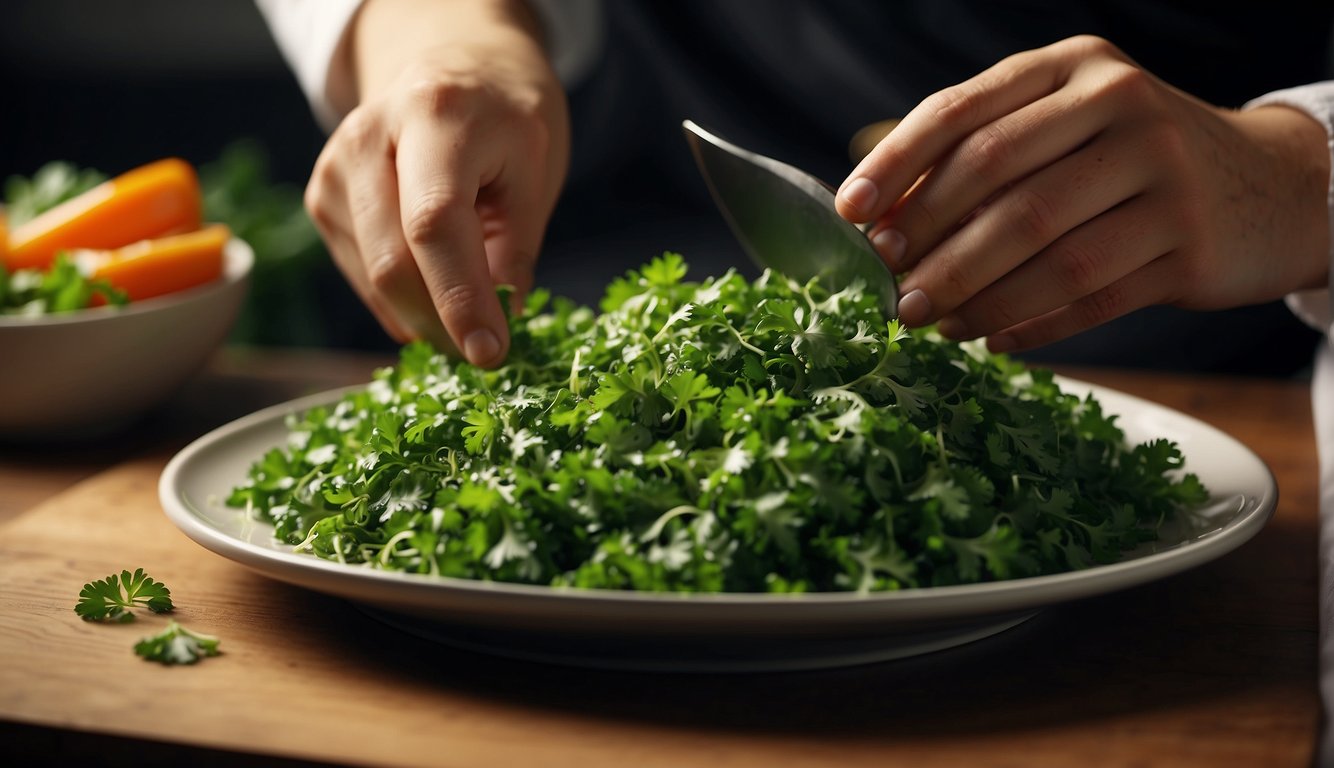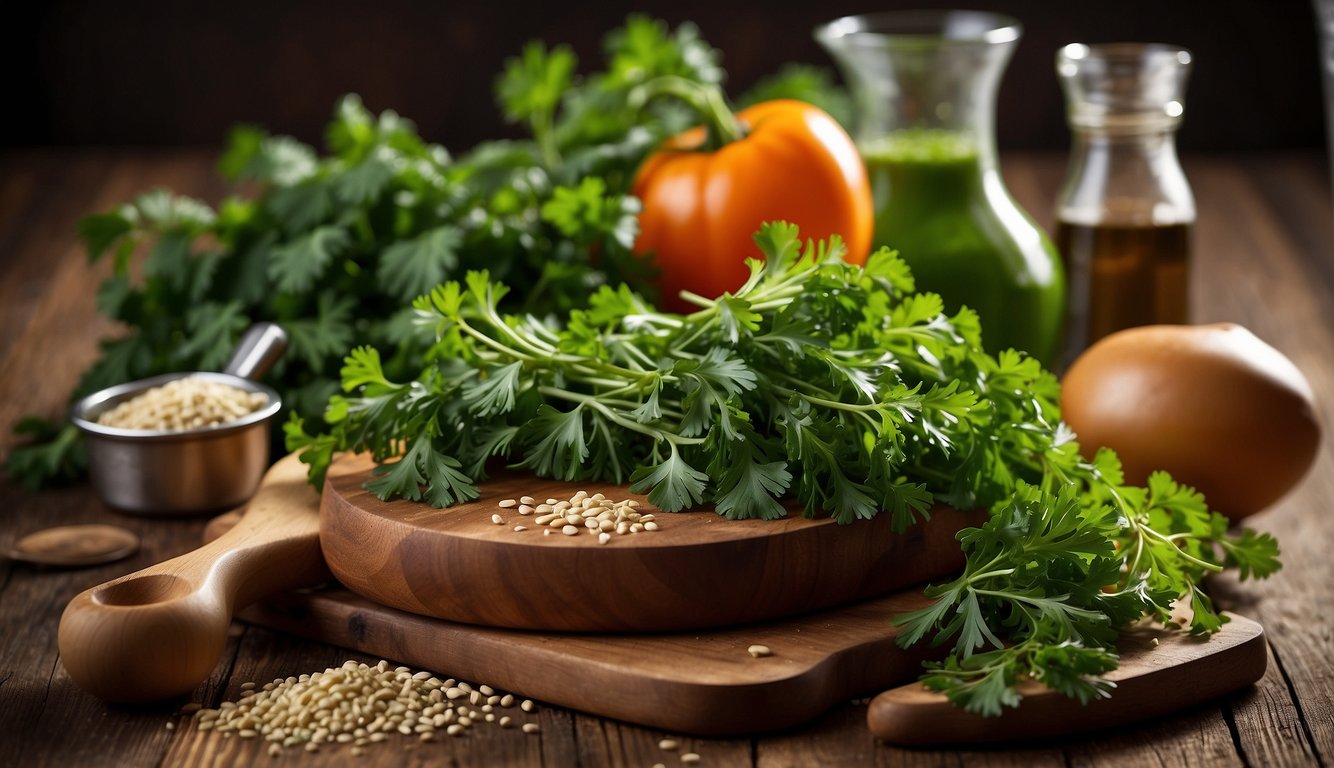TheHerbProf.com is a treasure trove of knowledge for those interested in natural healing and herbal remedies. The website is run by Paul Johnston MD. A naturopathic who has not only received extensive education in the field but also has personal experience in self-healing.
Parsley is a low-calorie herb that is commonly used as a garnish in many dishes. However, parsley is more than just a pretty decoration on your plate. But what are parsley benefits?
This herb is packed with nutrients and has been found to offer a range of health benefits.
As a good source of antioxidants, vitamins A, K, and C, and minerals like calcium, iron, magnesium, and potassium, parsley may help support various aspects of your health.
For instance, research suggests that parsley may help support bone health, eye health, and cancer prevention, among other benefits.
Additionally, parsley may help support blood sugar, heart, and kidney health.
In this article, I will explore the many health benefits of parsley and how you can incorporate this herb into your diet.
Whether you are looking to improve your overall health or simply want to add more flavor to your meals, parsley is a versatile and nutritious herb that is worth adding to your diet.
Nutritional Profile of Parsley
Parsley is a popular herb that is commonly used as a garnish or seasoning in many dishes. However, it is much more than just a pretty decoration.
It is packed with a variety of vitamins, minerals, and other nutrients that can provide numerous health benefits.
In this section, I will discuss the nutritional profile of parsley and its various components.
Vitamins and Minerals
Parsley is a rich source of vitamins and minerals that are essential for maintaining good health.
It is particularly high in vitamin C, vitamin K, and vitamin A.
According to Healthline, just two tablespoons of parsley (8 grams) can provide 16% of the recommended daily intake of vitamin C, 154% of the recommended daily intake of vitamin K, and 12% of the recommended daily intake of vitamin A.
In addition to these vitamins, parsley is also a good source of folate, calcium, iron, and magnesium.
Folate is important for cell growth and development, while calcium and magnesium are essential for maintaining strong bones.
Iron is necessary for producing healthy red blood cells, which carry oxygen throughout the body.
Macronutrients and Fiber
In addition to vitamins and minerals, parsley also contains macronutrients and fiber.
It is low in calories and carbohydrates, making it a great addition to any diet.
It also contains small amounts of protein and fiber, which can help you feel fuller for longer and aid in digestion.
According to Nutrition-and-You, 100g of parsley contains 3.07g of protein and 3.3g of fiber.
This makes it a great choice for those who are looking to add more plant-based protein to their diet or increase their fiber intake.
Health Benefits of Parsley

Parsley is a versatile herb that adds flavor and nutrition to many dishes. It is packed with antioxidants, flavonoids, apigenin, and other beneficial compounds that can help promote good health.
In this section, I will discuss some of the most significant health benefits of parsley.
Antioxidant Properties – Parsley Benefits
Parsley is an excellent source of antioxidants, which can help protect your body against free radicals and oxidative stress.
It contains high levels of lutein, zeaxanthin, carotenoids, and myricetin, all of which have been shown to have powerful antioxidant effects.
These compounds can help prevent chronic diseases such as heart disease, cancer, and diabetes.
Heart Health and Circulation
Parsley has been shown to have positive effects on heart health and circulation.
It contains compounds that can help lower blood pressure, reduce cholesterol levels, and prevent the formation of blood clots.
These effects can help reduce the risk of heart disease and stroke.
Cancer Prevention Potential
Parsley contains flavonoids and other compounds that have been shown to have cancer prevention potential.
These compounds can help prevent the growth and spread of cancer cells and reduce the risk of developing certain types of cancer, such as breast, prostate, and colon cancer.
Diabetes Management
Parsley may also be beneficial for people with diabetes.
It contains compounds that can help regulate blood sugar levels and improve insulin sensitivity.
These effects can help reduce the risk of developing diabetes-related complications, such as nerve damage, kidney disease, and vision problems.
Eye Health
Parsley is a good source of lutein and zeaxanthin, which are carotenoids that have been shown to have positive effects on eye health.
These compounds can help protect against age-related macular degeneration and other eye conditions.

Bone Health
Parsley contains high levels of vitamin K, which is essential for bone health.
It can help improve bone density and reduce the risk of fractures and osteoporosis.
Digestive Health – Parsley Benefits
Parsley has been used for centuries as a natural remedy for digestive problems.
It contains compounds that can help soothe inflammation in the digestive tract and improve digestion.
Immune Support and Inflammation
Parsley contains compounds that can help support the immune system and reduce inflammation in the body.
These effects can help reduce the risk of developing chronic diseases and improve overall health.
Culinary Uses of Parsley

As a versatile herb, parsley can be used in various culinary applications. Here are some ways to incorporate parsley into your dishes:
Parsley in Salads and Garnishes
Parsley is a popular ingredient in salads and garnishes. Its fresh and vibrant taste adds flavor and color to any dish.
You can chop parsley leaves and sprinkle them over your salad or use them as a garnish for soups, stews, and pasta dishes.
Parsley also pairs well with Mediterranean vegetables such as tomatoes, cucumbers, and olives.
Incorporating Parsley into Recipes – Parsley Benefits
Aside from salads and garnishes, parsley can be used in various recipes.
You can add chopped parsley to sauces and marinades to enhance their flavor.
Parsley can also be used as a primary ingredient in dishes such as tabbouleh, a Mediterranean salad made with bulgur wheat, parsley, tomatoes, and onions.
In addition, parsley can be added to smoothies and juices for a nutritional boost. Its high vitamin C content makes it a great addition to your diet.
You can also use parsley as a substitute for basil in pesto sauce for a unique twist on a classic recipe.
Other Uses and Benefits

As I researched parsley, I discovered that it has many other uses and benefits beyond its culinary uses. Here are a few interesting ones:
Parsley for Kidney Health
Parsley is believed to be helpful for kidney health. According to Healthline, parsley may help prevent the formation of kidney stones and improve kidney function.
This is because parsley contains compounds that act as diuretics, which help increase urine production and flush out toxins from the body. Parsley may also help reduce inflammation in the kidneys.
Parsley as a Breath Freshener – Parsley Benefits
Parsley is a natural breath freshener. Chewing on parsley leaves or drinking parsley tea may help combat bad breath.
This is because parsley contains chlorophyll, which has antibacterial properties that help kill odor-causing bacteria in the mouth.
Parsley may also help reduce gas and bloating, which can contribute to bad breath.
Potential Anti-Inflammatory and Antibacterial Effects
Parsley contains several compounds that may have anti-inflammatory and antibacterial effects. According to Dr. Axe, parsley contains antioxidants such as luteolin, apigenin, myristicin, and apiol, which may help reduce inflammation in the body.
These compounds may also have antibacterial effects, which may help prevent infections.
Preparation and Storage

As a culinary herb, parsley is a versatile ingredient that can be used in a variety of dishes. However, before using parsley, it is important to properly prepare and store it to ensure that it retains its flavor and nutritional value.
Fresh vs. Dried Parsley
Fresh parsley is a popular choice among chefs and home cooks due to its bright flavor and vibrant color.
Flat-leaf or Italian parsley is the most commonly used variety of fresh parsley in recipes.
To prepare fresh parsley, simply rinse it under cold water to remove any dirt or debris, pat it dry with a paper towel, and chop it finely.
Dried parsley, on the other hand, is a convenient option for those who want to keep parsley on hand for longer periods of time.
Dried parsley has a more concentrated flavor than fresh parsley, but it can lose some of its potency over time. To use dried parsley, simply add it to your recipe during the cooking process.
Storing Parsley for Longevity – Parsley Benefits
To store fresh parsley for longer periods of time, it is important to keep it fresh and hydrated.
One way to do this is to trim the stems and place the parsley in a jar or container of water, similar to how you would store fresh flowers. This will keep the parsley hydrated and fresh for up to a week in the refrigerator.
Another way to store fresh parsley is to wrap it in a damp paper towel and place it in a plastic bag in the refrigerator. This will help to keep the parsley fresh for up to a week.
Dried parsley, on the other hand, should be stored in an airtight container in a cool, dry place away from direct sunlight.
This will help to preserve its flavor and potency for up to six months.
Ancient Times – Parsley Benefits
In ancient times, parsley was dedicated to Persephone, the wife of Hades and goddess of the underworld. Parsley is slow to germinate. Folk legend explains this characteristic with the myth that parsley must first visit Hades seven times before it may freely germinate and flourish on the earth. It was also believed that the herb would flourish only in gardens where a strong woman presides over the household. Parsley was used as a ceremonial herb in ancient Greek and Roman cultures. The herb was sprinkled on corpses to cover the stench, and planted on the graves of loved ones. Roman gladiators ate parsley before facing foes in the arena.
Considerations and Potential Side Effects

As with any herb or supplement, it’s important to be aware of any potential side effects or interactions with medications.
While parsley is generally considered safe for most people, there are some considerations to keep in mind.
Interactions with Medications
Parsley may interact with certain medications, including blood thinners and medications for high blood pressure.
If you are taking any medications, it’s important to talk to your healthcare provider before adding parsley to your diet or taking a parsley supplement.
Allergic Reactions and Sensitivities – Parsley Benefits
Some people may be allergic or sensitive to parsley.
Symptoms of an allergic reaction can include itching, swelling, and difficulty breathing. If you experience any of these symptoms after consuming parsley, seek medical attention immediately.
Other Considerations
Parsley is a diuretic, which means it can increase urine production and may cause dehydration if you do not drink enough water.
Additionally, parsley may affect blood clotting, so it’s important to be cautious if you are taking blood thinners or have a bleeding disorder.
German Commission – Parsley Benefits
The German Commission E, an advisory panel on herbal medicines, has approved parsley for use in the prevention and treatment of kidney stones. The saponin content of parsley may help relieve coughs. Parsley root is laxative and its carminative action can relieve flatulence and colic. Parsley is rich in vitamins and minerals, including A and C, as well as calcium, thiamin, riboflavin, niacin, zinc, potassium, and iron. The boron and fluorine in parsley give strength to the bones. Parsley’s high chlorophyll content makes this beneficial herb a natural a tasty breath freshener.
Linking Parsley Benefits to TheHerbProf.com
Parsley is a versatile herb with a multitude of health benefits, and at TheHerbProf.com, we’re all about exploring these benefits! Here’s how our website and this subject harmonize:
- Parsley Prose: We provide comprehensive information about parsley, its medicinal properties, and its uses in herbal medicine.
- Herbal Highlights: Our site offers insights into how parsley can be incorporated into your herbal regimen.
- Culinary Creations: We share delicious recipes that showcase the versatility of parsley in cooking.
- Health and Wellness: Our focus is on promoting overall health and wellness, and parsley plays a crucial role in this.
- Community Connection: Connect with others who are passionate about parsley and share your experiences.
So, whether you’re a parsley enthusiast or just starting your herbal journey, TheHerbProf.com is your trusted guide. Remember, stay curious and stay healthy!
References:
Little Herb Encyclopedia, by Jack Ritchason; N.D., Woodland Publishing Incorporated, 1995
The Ultimate Healing System, Course Manual, Copyright 1985, Don Lepore
Planetary Herbology, Michael Tierra, C.A., N.D., Lotus Press, 1988
Handbook of Medicinal Herbs, by James A. Duke, Pub. CRP Second Edition 2007
The Complete Medicinal Herbal, by Penelope Ody, Published by Dorling Kindersley
Before You Go – Check the Following Articles!
Thyroid Disease, A Naturopathic Answer
Check these Categories:
Frequently Asked Questions – Parsley Benefits

What are the potential health benefits of consuming parsley for the stomach?
Parsley is known to have anti-inflammatory properties that can help soothe the stomach.
It can also aid in digestion by increasing the production of digestive juices and enzymes. Additionally, parsley has been shown to help reduce bloating and gas, which can be uncomfortable and painful.
Can parsley have any side effects when consumed regularly?
While parsley is generally considered safe for consumption, consuming large amounts of parsley over an extended period of time can cause some side effects.
Parsley contains a compound called oxalate, which can lead to the formation of kidney stones in some people. Additionally, consuming large amounts of parsley can cause an upset stomach, diarrhea, and dehydration.
How does parsley impact skin health?
Parsley is rich in antioxidants, which can help protect the skin from damage caused by free radicals.
These antioxidants can also help reduce inflammation and improve the overall appearance of the skin. Additionally, parsley contains vitamin C, which is essential for collagen production, a protein that gives skin its elasticity.
What is the recommended daily intake of parsley to avoid overconsumption?
The recommended daily intake of parsley is about 2-3 tablespoons, which is roughly equivalent to one small bunch.
This amount is generally considered safe for most people and is unlikely to cause any adverse effects.
How does the combination of garlic and parsley enhance their individual benefits?
Garlic and parsley are both known for their health benefits, and when consumed together, they can enhance each other’s benefits.
Garlic contains compounds that can help reduce inflammation and boost the immune system, while parsley is rich in antioxidants that can help protect against cellular damage. Together, these two ingredients can help promote overall health and well-being.
What are the detoxifying effects of parsley on the blood?
Parsley has been shown to have detoxifying effects on the blood, thanks to its high levels of chlorophyll.
Chlorophyll is a natural blood purifier that can help remove toxins and impurities from the bloodstream.
Additionally, parsley contains compounds that can help improve circulation and reduce inflammation, which can further support the body’s detoxification process.


